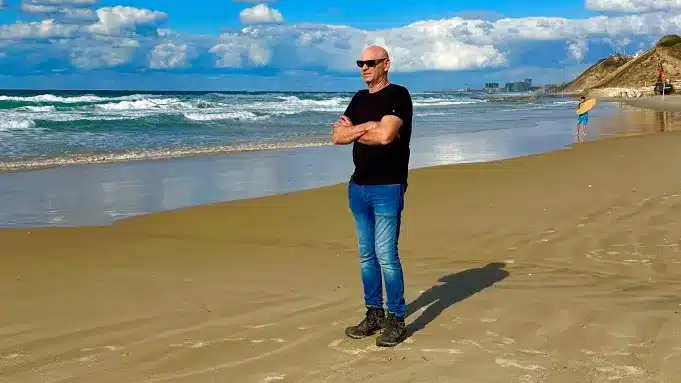
When word spread that the Toronto International Film Festival had pulled an Israeli-produced October 7 documentary — allegedly over fears of a copyright challenge from Hamas — even seasoned observers did a double take. It sounded less like a serious film industry decision and more like something you’d read in The Babylon Bee.
Multiple outlets reported that TIFF initially accepted “The Road Between Us: The Ultimate Rescue,” a documentary chronicling the October 7 attacks, but then reversed course, citing copyright concerns related to Hamas footage, potential security risks, and objections from festival staff.
The film tells the true story of Haaretz journalist Amir Tibon and his family, who were trapped in their safe room on Kibbutz Nahal Oz during the October 7 attacks — and the extraordinary rescue mission mounted by Tibon’s father, retired IDF Maj. Gen. Noam Tibon, who drove from Tel Aviv through active fire to reach them.
To many who spoke to Unpacked on Thursday — noting that the film was ultimately reinstated — the claim that Hamas might mount a legal challenge seemed absurd, especially given that Hamas footage has already been used extensively by major news organizations and award-winning documentaries. Yariv Mozer’s “We Will Dance Again,” which recounts the massacre at the Nova Music Festival, won this year’s Emmy Award for Outstanding Current Affairs Documentary. The documentary October 8 — which also relied on Hamas images — screened in theaters nationwide.
“October 8” features pro-Israel activist Tessa Veksler, who discusses how activists attempted to oust her from her role as student body president at the University of California, Santa Barbara, because of her pro-Israel views.
“The copyright claim is ridiculous and, from what I saw, turned out to be a fake excuse,” Veksler told Unpacked. “The decision to exclude the film was clearly because members of the TIFF team did not want to show an Israeli perspective of October 7. Film festivals should understand they are a space for discussion, and sometimes that means showing films that are not your perspective and finding a way to have an adult conversation around it. These conversations these days are lacking on all sides.”
Toronto International Film Festival situation “smells like rotten fish”
Toronto-based documentary filmmaker Ronen Israelski — whose own film 3 Days in October also uses Hamas’s livestreamed footage — called TIFF’s copyright argument ridiculous.
First, he noted that the footage in question was broadcast by Hamas over social media and is therefore effectively in the public domain. Second, even if permission were somehow needed, many of the terrorists who filmed the attacks are now dead. And third, he pointed to TIFF’s own track record.
“I was there when they showed ‘The Bibi Files,’” Israelski said. “90 percent of the movie is investigation footage that not only did they not receive permission, but there was also a gag order by an Israeli court not to show it. They showed it and it was no problem, and now there is an absurd excuse of copyright? It smells like rotten fish.”
Israelski, who also hosts Perspectives TV, added that many in the industry suspect outside pressure may have been applied, and warned that the same tactics could soon be used to block the film from other festivals.
Former New York State Assemblyman Dov Hikind — founder of Americans Against Antisemitism — said he believes TIFF ultimately had no choice but to reinstate the film.
“I would not say anything nice about them reversing it,” Hikind told Unpacked. “They almost had no choice. The reason they gave was that they didn’t get permission from the Nazis of 2025. (Reich Minister of Propaganda Josef) Goebbels did not give permission, if you know what I mean. This was pathetic and sick, and ranks up there to win the award for absolutely shameful behavior of a film festival. You can’t capitulate to Hamas. It is outrageous to think that real people knew what the facts were and decided to remove the film. There isn’t much more to say.”
Shortly after Hikind’s comments, Variety reported that TIFF CEO Cameron Bailey and the film’s director, Barry Avrich, had issued a joint statement: “We have worked together to find a resolution to satisfy important safety, legal, and programming concerns. We are pleased to share that ‘The Road Between Us: The Ultimate Rescue’ will be an official TIFF selection at the festival this year, where we believe it will contribute to the vital conversations that film is meant to inspire.”
Bailey continued to deny that the festival’s original decision amounted to censorship.
“The Road Between Us” Cancelation is part of a larger trend
Jewish rapper Kosha Dillz — born Rami Matan Even-Esh — said he hopes TIFF holds its ground and doesn’t allow “mob mentality” to dictate which voices and viewpoints are allowed.
He pointed to his own recent experience with “Bring the Family Home,” a documentary he produced and planned to screen at Facets in Chicago this past May. According to Even-Esh, the venue canceled just a few hours before showtime, citing vague “security concerns.” After what he described as a good-faith conversation over Zoom — during which Facets agreed to reschedule the screening — the venue canceled a second time.
“People will throw out excuses when they are cowardly,” he said. “But the legal angle of copyright is straight up insane. Whoever thought of that deserves a prize for stupidity. The point is you can’t steal life experience from storytellers.”
Even-Esh said he worries about the growing normalization of shutting down Jewish films and artists — and added that, above all, he hopes the remaining Israeli hostages will soon be brought home.
That sentiment was echoed by Hillel Fuld, the Israeli tech and marketing entrepreneur who paused his business after Oct. 7 to focus entirely on pro-Israel advocacy. Fuld, whose brother Ari was murdered in a 2018 terror attack, has since become a prominent voice online and a frequent guest on international news outlets.
“Nothing about Jew hatred surprises me anymore,” Fuld told Unpacked, adding that the idea Hamas footage might need to be legally cleared before screening a documentary is “insanity.”
What is “The Road Between Us” About?
The film tells the story of one of the most dramatic rescues of October 7, 2023. Haaretz journalist Amir Tibon was at home on Kibbutz Nahal Oz with his wife, Miri, and their two young daughters — Galia, 3, and Carmel, 1 — when Hamas terrorists infiltrated the kibbutz.
Upon hearing what was happening, Amir’s father, Noam Tibon — a retired Israel Defense Forces major general — grabbed his gun in Tel Aviv, got in his car, and drove south into what was effectively a war zone. In scenes many have compared to a Liam Neeson–style rescue, he miraculously navigated active gun battles and arrived at the kibbutz in time to save his family.
In his book “The Gates of Gaza: A Story of Betrayal, Survival and Hope in Israel’s Borderlands,” Amir describes both the hope that “Saba” (his daughters’ grandfather) would reach them and the very real possibility that Noam could be killed on the way. He recalls opening the safe-room door for his father and bracing for the possibility that terrorists might be behind him.
“As I watched my father walk into our living room, it occurred to me that the soldiers alongside him were all in uniform and tactical gear, whereas he was in street clothes, albeit with a helmet on his head and an M16 in hand. I didn’t notice at the time that he was wearing green tzitzit, but I did see there were bloodstains on his jeans. It took me another second to confirm that the blood wasn’t his…”
Earlier in the book, Amir describes the moment they realized the unthinkable had happened: “The network of fences, cameras, and other security apparatuses that we had always believed would protect us from the army of terror on the other side of the border had been breached. Hamas was coming for us.”
The full version of “The Road Between Us” — including the dramatic account of Noam Tibon’s rescue mission — is expected to screen at TIFF later this year. And while the festival insists no censorship took place, critics say the controversy itself is a warning sign.
After all, it’s not every day you hear that a major Western film festival nearly shelved a documentary because Hamas might sue.
